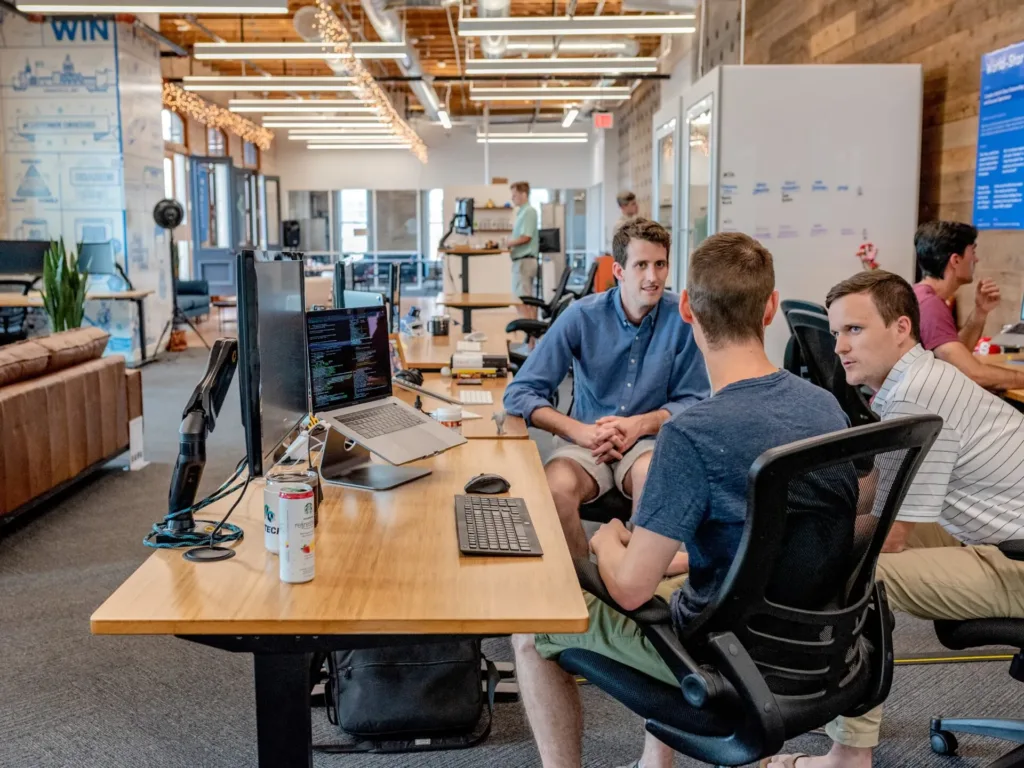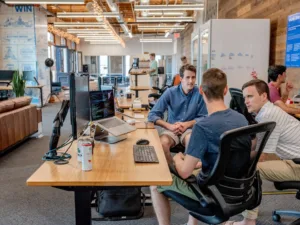Key roles and responsibilities when implementing a DAP

The successful implementation of a DAP in a large enterprise context requires a well-defined governance structure. A governance structure could include a lean Center of Excellence (CoE), which would strategically drive all DAP efforts on an organizational level and support Departments in maximizing the impact of a DAP for their key applications. . Content creation and maintenance should be covered by subject matter experts (DAP Content Managers) within individual departments. This combination of centralized and decentralized governance ensures that the DAP strategy aligns with both enterprise-wide and department-specific goals.
Table of Contents
Center of Excellence (CoE)
A Center of Excellence (CoE) is a dedicated team or group responsible for overseeing the governance, best practices, and continuous improvement of the DAP within the organization. The CoE is a centralized resource hub, providing guidance, support, and knowledge-sharing to drive consistent DAP usage and effectiveness across departments.
When thinking about how to structure a Center of Excellence, it is important to assess the scope of the planned DAP initiatives. One major fallacy when planning the Center of Excellence is to aggregate too much responsibility and create centralized bottlenecks. Ideally, the CoE has a supportive function and enables subject matter experts within the department to create and maintain content in a decentralized way on their own. Centralized content creation often requires heavy investment into a large CoE and becomes slow and costly over time, especially as content needs to be maintained. A Lean Center of Excellence should encompass the following roles:
Digital Adoption Architect
The Digital Adoption Architect is the key driver of the DAP initiative across the enterprise. Their responsibilities include setting the strategic direction for the DAP initiative, managing relations with the DAP vendor (Userlane in this case), overseeing the overall DAP budget, and monitoring the effectiveness and ROI of the DAP through metrics such as Userlane’s HEART framework (Happiness, Engagement, Adoption, Retention, Task Success).
Considering the technical nature of the DAP and its strategic impact, the Digital Adoption Architect would ideally sit within the IT department or a dedicated digital transformation office and report directly to the Executive Sponsor of the DAP initiative, often the CIO or the Head of Digital Transformation. It requires someone with strong project management, strategic thinking, and people skills to collaborate successfully with various departments.
Their responsibilities encompass the following key areas:
- DAP Strategy Development: The Digital Adoption Architect leads the development of the overall DAP strategy. This includes defining the goals of the DAP, selecting the key applications to be covered, and establishing the criteria for success. For example, they might define a goal of reducing support tickets related to Salesforce by 30% within the first six months of implementing Userlane.
- DAP Implementation: The Digital Adoption Architect oversees the implementation of the DAP across the organization. They work closely with the IT team to ensure a smooth integration of Userlane with other applications, and they coordinate with department leads to ensure the DAP is tailored to the needs of each department.
- Vendor Relationship Management: The Digital Adoption Architect maintains the relationship with the DAP vendor, in this case, Userlane. They coordinate with the vendor for technical support, software updates, or training resources. They may also negotiate contract terms and handle procurement processes.
- Stakeholder Engagement: The Digital Adoption Architect engages with all stakeholders involved with the DAP. This includes presenting updates to the executive sponsor, coordinating with the training team for user training, and working with department leads to encourage DAP adoption.
- DAP Performance Monitoring and Reporting: The Digital Adoption Architect monitors the performance of the DAP and reports on its impact. This could involve using Userlane’s analytics to track user engagement, usage trends, and reducing support tickets. They would then present this information to stakeholders to demonstrate the ROI of the DAP.
By fulfilling these responsibilities, the Digital Adoption Architect ensures the successful implementation, adoption, and ongoing effectiveness of the DAP, thereby contributing to the broader digital transformation goals of the organization.
Adoption Experience Expert
The Adoption Experience Expert is an operational role responsible for providing expert guidance and support to departments across the organization in utilizing the Digital Adoption Platform (DAP) effectively. They work closely with department leads to ensure autonomous and successful DAP usage while staying up-to-date with the latest best practices and vendor updates. The Adoption Experience Expert empowers departments to tailor the DAP to their specific needs while driving a cohesive approach to user adoption and software experience. Ideally, the Adoption Experience Expert collaborates closely with the Digital Adoption Architect within the Lean Center of Excellence (CoE) to ensure departmental alignment with the overall DAP strategy and goals.
Responsibilities:
- Departmental Support: The Adoption Experience Expert collaborates with department leads to assess department-specific needs and challenges. They provide ongoing support and best practices to ensure that the DAP aligns with the unique requirements of each department.
- User Guidance: They facilitate workshops and training sessions to enhance the proficiency of content creators within departments. The Adoption Experience Expert ensures that users are well-informed about the DAP’s features and capabilities to maximize its potential.
- Best Practices: Staying up-to-date with the latest developments and best practices in DAP utilization, the Adoption Experience Expert shares this knowledge with departments, enabling them to adopt effective strategies for driving user engagement and software experience.
- Vendor Updates: The Adoption Experience Expert liaises with the DAP vendor to stay informed about software updates, new features, and training resources. They communicate these updates to departments, ensuring they are aware of the latest enhancements.
- Content Quality Assurance: Collaborating with content creators, the Adoption Experience Expert ensures that the content delivered through the DAP adheres to best practices and aligns with user needs, enhancing the overall user experience.
- User Feedback Analysis: The Adoption Experience Expert gathers user feedback and analyzes data from the DAP to identify areas for improvement and opportunities for enhancing user adoption and satisfaction.
Technical Specialist
The Technical Specialist is a critical role responsible for overseeing all technical aspects of the Digital Adoption Platform (DAP) within the organization. They play a central role in managing API connections, integrating the DAP with existing systems, and ensuring smooth functionality across applications. The Technical Specialist works closely with the IT team, DAP vendor (Userlane), and department leads to maintain seamless technical operations and drive successful DAP implementation.
Responsibilities:
- Implementation & Integration: The Technical Specialist is responsible for the technical rollout of the DAP, which will happen in most cases via a browser extension. They are also responsible for integrating the DAP with existing APIs and systems within the organization, such as Active Directories. They ensure data synchronization and seamless communication between the DAP and other applications.
- Technical Support: They provide technical support to department leads and end-users, addressing any technical issues or challenges related to the DAP’s integration and functionality.
- Compatibility & Compliance: The Technical Specialist collaborates with the IT team to ensure that the DAP is compatible with the organization’s infrastructure and complies with security and data privacy requirements.
- Technical Documentation: The Technical Specialist creates and maintains technical documentation, including integration guidelines and troubleshooting procedures.

Other Key Stakeholders
Executive Sponsor
The Executive Sponsor is a senior leader within the organization who champions the DAP initiative. They typically have significant influence within the organization and have a vested interest in the success of digital initiatives. Ideal candidates for this role could be a Chief Information Officer (CIO), Chief Technology Officer (CTO), Chief Operations Officer (COO), or even the Chief Executive Officer (CEO), given their strategic overview and influence in driving innovation and operational efficiency.
Here are two ways an Executive Sponsor might interact with and benefit from a DAP:
Strategic Alignment: The Executive Sponsor ensures that the DAP aligns with the organization’s broader strategic objectives. A COO, for example, might ensure that Userlane is integrated with key operational systems such as ERP, CRM, or HRM platforms to streamline the workflows and drive efficiency across the operations.
Resource Allocation: The Executive Sponsor is crucial in securing the necessary resources for the DAP. They could work closely with finance and procurement departments to allocate budget and expedite the procurement process. For example, a CIO might secure the necessary budget for Userlane and fast-track its acquisition as a strategic technology investment.
In essence, the Executive Sponsor serves as a catalyst for change, ensuring that the DAP is given the attention, resources, and support it needs to drive digital transformation within the organization. They benefit from the DAP as it directly contributes to the organization’s strategic objectives, such as increasing operational efficiency, enhancing user experience, and maximizing the value of digital investments.
Departmental DAP Leads
Departmental DAP Leads are representatives from each department responsible for driving the DAP initiative within their respective departments. They work closely with the Digital Adoption Architect to align the DAP strategy with departmental needs, identify specific departmental applications for DAP coverage, and promote the use and benefits of the DAP within their departments. While the DAP content creation is mostly done by subject matter experts in their teams (see “DAP Content Managers”), Departmental DAP leads are responsible for championing the use of the DAP within their teams.
Their main responsibilities can include the following:
- Understanding DAP Capabilities: Department leads need to understand the benefits and capabilities of Userlane, and how it can support their team’s functions and goals. For instance, a leader in the HR department might need to understand how Userlane can simplify the usage of Workday, making it easier for team members to manage employee benefits, recruitment processes, or employee data.
- Identifying Key Applications: They should work closely with the Digital Adoption Architect and IT team to identify the key applications used by their department that should be covered by the DAP. For example, a sales department lead might identify Salesforce as a key tool that would benefit from Userlane’s in-app guidance.
- Providing Feedback and Improvement Suggestions: As they are closely involved with the day-to-day functions of their teams, department leads can provide valuable feedback and suggestions for improving the DAP. This could involve recommending new features, reporting issues, or providing insights into how the DAP can better support their team’s needs.
DAP Content Managers
DAP Content Managers are subject matter experts within each department who play a pivotal role in driving the success of the Digital Adoption Platform (DAP). They are responsible for creating and maintaining in-app DAP content, such as interactive guides, tooltips, and announcements, tailored to the specific applications used within their department. These managers also handle the day-to-day operations of the DAP, ensuring its seamless integration and optimal usage within their respective departments. Their responsibilities include:
- Subject Matter Expertise: Departmental Content Managers are well-versed in the applications relevant to their department, such as Salesforce or Workday. They understand where friction occurs and are knowledgeable about all key processes of the application.
- Content Creation: They create interactive guides, tooltips, and announcements within the DAP, ensuring that the content aligns with the department’s needs and supports users in navigating and utilizing the applications effectively.
- Feedback Collection: Being embedded within their departments, they gather feedback from users regarding both the DAP’s effectiveness, and areas of friction of the underlying application. This feedback helps drive continuous improvement of the DAP’s content and functionality.
- Knowledge-Sharing: They collaborate closely with the DAP Expert within the Center of Excellence (CoE) to ensure that the DAP’s content meets the highest standards of user engagement and value delivery.
Having dedicated DAP Content Managers within each department significantly enhances the success of the DAP initiative. These managers ensure that the DAP’s content is tailored to the department’s unique needs and processes, fostering greater user adoption and satisfaction. This role encourages autonomy and departmental ownership while maintaining a centralized approach through collaboration with the CoE.
Consultants and Partners
External consultancies and implementation partners are professional organizations that provide expertise and support for successfully implementing the Digital Adoption Platform (DAP). They collaborate closely with the organization’s stakeholders to understand their unique needs, align the DAP implementation with the broader digital transformation strategy, and provide guidance throughout the implementation process.
- Strategic Guidance: Providing strategic advice and guidance on the DAP implementation, including best practices and industry insights.
- Technical Implementation: Assisting with the technical aspects of the DAP implementation, including configuration, integration with existing systems, and data migration.
- Change Management Support: Supporting change management efforts by providing training materials, conducting workshops, and facilitating user adoption.
- Customization and Tailoring: Customizing the DAP to meet specific organizational requirements and user needs.
- Ongoing Support and Maintenance: Providing ongoing technical support, troubleshooting, and software updates to ensure the smooth operation of the DAP.
The involvement of external consultancies and implementation partners can vary based on the organization’s needs and complexity. Especially for a large, global DAP initiative, external partners can accelerate the time to value and maximize its benefits. When selecting an external partner, organizations should consider engaging vendor-certified consultancies to ensure the partner can provide the required DAP expertise and experience.

Organizational Best Practices
When setting up a Center of Excellence (CoE) for the Digital Adoption Platform (DAP), there are several best practices to follow and potential pitfalls to avoid:
Things to Do:
- Align with Organizational Goals: Ensure that the CoE’s objectives align with the organization’s broader digital transformation goals. This alignment will drive synergy and promote a shared vision for the successful implementation and utilization of the DAP. Ensure all stakeholders, especially Executive Sponsors, have easy access to actionable insights.
- Create Collaboration and Knowledge Sharing: Foster a collaborative environment within the CoE and towards all stakeholders, encouraging knowledge-sharing and cross-departmental engagement. Regular meetings, workshops, and communication channels help facilitate collaboration and create a culture of continuous improvement.
- Promote Departmental Ownership: Empower individual departments by giving them ownership over content creation and customization within the DAP. Departments that actively contribute to the DAP’s success are more likely to drive higher user adoption and value realization. Having dedicated DAP Content Managers within each department who know the respective application, is the ideal setup to handle content creation and maintenance.
Things to Avoid:
- Centralization Overload: Avoid centralizing content creation within the CoE. While centralization can be beneficial for governance, it should not hinder departments from having autonomy in tailoring the DAP to their specific needs and reacting quickly to new requirements.
- Going too big, too early: Stay adaptable and avoid building a large CoE right at the start. Embrace agility to respond quickly to emerging needs and changes, allowing for flexibility in adopting new strategies and approaches and adding resources as the DAP scope increases throughout the organization. Depending on the scope of the DAP project, some roles mentioned above can be filled in addition to another role. For example, a Salesforce expert could serve as the DAP Content Manager. Also, as the DAP coverage grows, adding multiple DAP experts in the Center of Excellence is a sensible way to scale in addition to getting project-based support from Consultants and Partners.
- Making uninformed decisions: Avoid investing major effort into content creation without data. Utilize data-driven insights to measure the current usage and adoption of your applications, identify areas that are underutilized, and make smart investments to improve the value realization.
Summary
By following these best practices and avoiding common pitfalls, the CoE can play a pivotal role in driving the successful implementation and utilization of the DAP. A lean and agile CoE, empowered with collaboration and a user-centric approach, ensures that the organization maximizes the value derived from its DAP investment and achieves its digital transformation objectives effectively.

